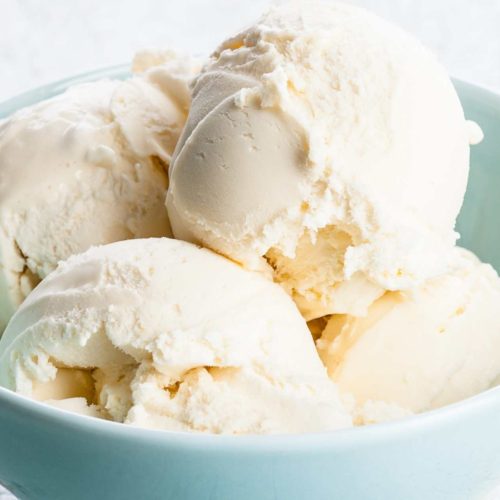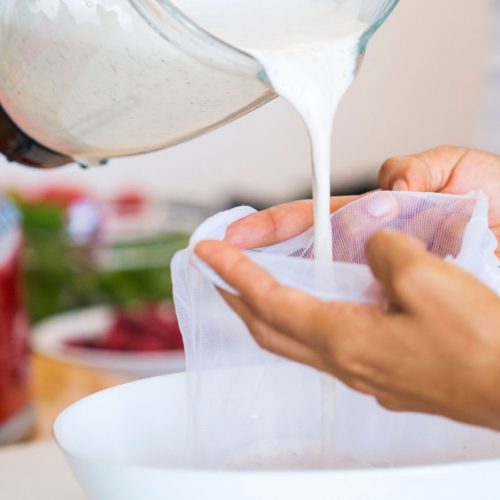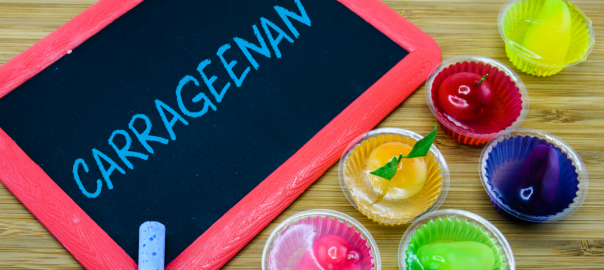Is it the carrageenan from seaweed?
Have you ever had gut health issues after you've eaten something? You know what I'm talking about, you eat a meal, and then after you eat, suddenly your belly starts to blow up or your gut starts to roil and it doesn't feel good. Maybe you start getting constipation or diarrhea. A lot of people may think that it's due specifically to foods that they're eating. However, it's not just what you eat, it's what's in what you eat. Carrageenan is found in a lot of foods.
As a matter of fact, it appears in virtually every aisle of the grocery store. You can find it in lunchmeat, dairy products, beverages, ice cream, supplements, and more. When you're looking for it on the label, you will often most usually see it listed as carageenan. But sometimes it's listed as sea vegetable extract. You need to aware of that when you’re reading the labels.
Problems with carrageenan
As a food additive it can affect your gut because it pulls a lot of water into the intestines. This means if you're dehydrated, or if you're not drinking extra water to make up for that, you can potentially have gut health issues. It's tied to gastrointestinal inflammation and has even been shown to have a link to colon cancer.
There are a number of studies out there showing the challenges of consuming carrageenan. One stated that all of the different isomers all the different structures of carageenan were found to induce colitis. And then carageenan-induced colitis was also found to be correlated to changes in the composition of our microbiome, the bacteria that live in our gut. The challenge is that we need a healthy gut in order for us to be healthy. So if we're eating things that are changing our microbiome, that is going to have a downstream impact a long term effect on our health. We definitely don't want to do that. This particular study found that the results corroborated previous studies that showed that there are harmful gastrointestinal effects from consuming carageenan.
The FDA continues to list carrageenan [kar-uh-gee-nuh n] as a Generally Recognized As Safe (GRAS) food additive despite decades of scientific studies proving that it causes gut inflammation, intestinal lesions, ulcerations and even malignant tumors. Many individuals who experience belly bloating, irritable bowel syndrome and inflammatory bowel disease notice a dramatic improvement in their symptoms after removing carrageenan from their diet. Continued consumption of carrageenan can cause chronic inflammation which is the root-cause of all chronic diseases, such as heart disease, stroke, diabetes, rheumatoid arthritis, Alzheimer’s, Parkinson’s, and even cancer.
A study done in 2012 by the University of Illinois at Chicago proved that the consumption of carrageenan contributes to diabetes as it impairs glucose tolerance and increases insulin resistance.
What is carrageenan?
The food industry extracts carrageenan from red seaweed using an ionic salt of alkali metals that washes out everything that will dissolve in water leaving behind the carrageenan and other insoluble matter like cellulose. This form is called “food-grade” or “undegraded” carrageenan. When processed with acid, carrageenan is degraded to a low molecular weight. This “degraded” carrageenan is not allowed to be used as a food additive due to its known harmful effects, but because it works so well at causing inflammation, scientists for drug companies often use it to induce inflammation in lab animals to test their anti-inflammatory drugs. The problem here is that when “undegraded” carrageenan hits our stomach acid, scientists are concerned that it may become degraded, exposing us to the toxic form of carrageenan.
Why is carrageenan in our food?
The food industry uses carrageenan as a thickener in non-fat and low-fat foods, as a stabilizer in beverages that naturally separate, as a binder in low-sodium and low-fat deli meat and to improve tenderness and maintain juiciness in pre-cooked poultry. It’s found in many processed foods, even in organic food! Below are examples of products and a few brand names commonly containing carrageenan. For a more extensive list of brand names with and without carrageenan, see The Cornucopia Institute’s Shopping Guide to Avoiding Foods with Carrageenan.
|
|
|
|
|
|
|
|
* Blue Bell Creameries was shut down for significant Listeria poisoning and reopened in August 2015.
A majority of the above information came from the Carrageenan 2013 Report published by The Cornucopia Institute.
What can you do to avoid carrageenan?
Make your own ice cream and nut milk!

Homemade Vanilla Ice Cream
Ingredients
- 3 egg yolks (organic and pasture raised)
- 1/2 cup maple syrup (organic)
- 1 tablespoon vanilla extract (organic)
- 1 tablespoon arrowroot powder (organic)
- 3 cups heavy cream (organic and raw, not pasteurized)
Instructions
- Beat egg yolks and blend in remaining ingredients.Pour into an ice cream maker and process according to instructions. For ease of serving, transfer ice cream to a shallow container, cover and store in the freezer.

Homemade Almond Milk
Ingredients
- 1 cup almonds (raw and organic, unpasteurized if possible - must come from outside the U.S. or from a local farmer who doesn’t sterilize them as all almonds produced in the U.S. are now required to be “sterilized”)
- 3 - 4 cups water (filtered or spring - no tap water!)
- For a sweeter taste, add one of these options:
1 tsp honey (raw and organic)
½ tsp vanilla extract (organic) or 1 Madagascar vanilla bean (organic)
Instructions
- Soak almonds for 8 - 12 hours in filtered water. Rinse and drain almonds thoroughly.
- Blend almonds and 3 cups of water (and optional sweetener) in a blender on high for about 2 minutes until nuts are pulverized.
- Add more water if a thinner consistency is desired. This step is optional, as the small particles remaining are just fine to consume… strain through a nut bag or cheesecloth to remove the small particles.
Don’t forget to listen in to my Mapping Carrageenan interview on The 15 Minute Matrix with Andrea Nakayama.

